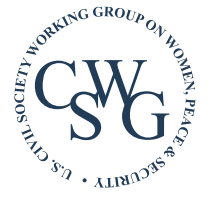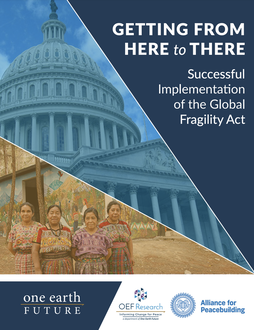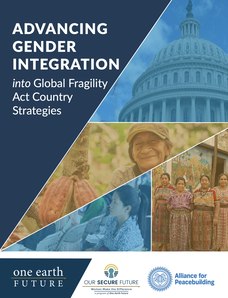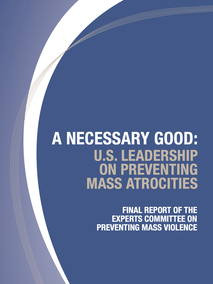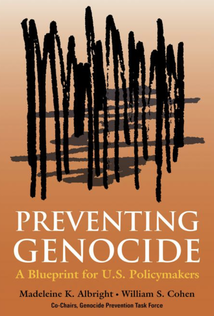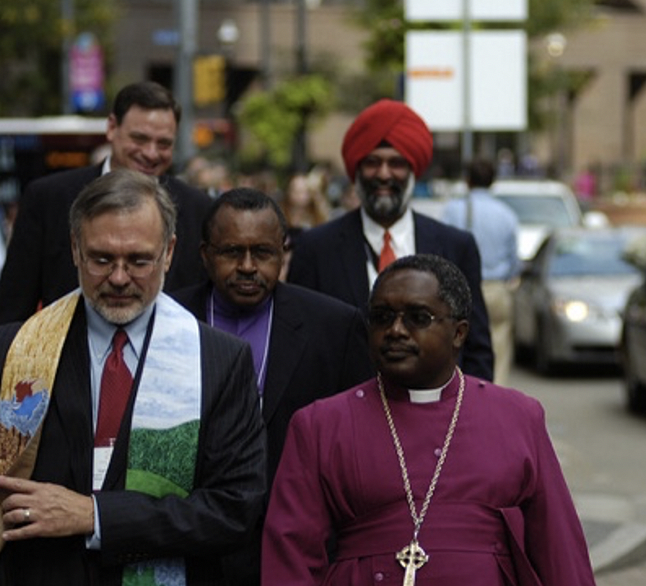Expert advocates play a crucial role informing officials on how to shape effective policies and implementation plans. Below are examples of civil society publications and memo with recommendations that were instrumental in shaping U.S. Government initiatives and implementation plans.
|
The U.S. Civil Society Working Group on Women Peace and Security has been instrumental in providing recommendations to the U.S. government and Congress. The U.S. Institute of Peace serves as a secretariat for this civil society working group, which was instrumental in adoption of the first U.S. National Action Plan on Women, Peace, and Security when President Barack Obama signed an executive order (Executive Order 13595) on December 19, 2011, 11 years after the United Nations Security Council adopted United Nations Security Council Resolution 1325 on women, peace, and security. Later, this working group collaborated with Congress to shape the Women, Peace and Security Act, which was signed into law by President Donald Trump. The working group then collaborated with officials in the U.S. Government to help shape the U.S. government's implementation plan for the WPS Act. Original documents with recommendations, included:
|
|
Alliance for Peacebuilding and One Earth Future Foundation released the Getting From Here to There: Successful Implementation of the Global Fragility Act which includes recommendations, data-driven methodology, and a list of priority stabilization and prevention countries and regions. COVID-19 pandemic is not just a health crisis, but essentially “stabilization in reverse” -- upending governance, economies, and human and food security globally. The challenges facing the development, humanitarian and peacebuilding sectors globally are significant, complex, and interconnected. It is critical now more than ever to understand and begin applying the principles in the GFA that call for a multisectoral integrated approach that ensures peacebuilding and conflict prevention are at the center of the pandemic response strategy. For more information, click: here. To download this report with recommendations for the U.S. government, click: here.
|
|
This Gender Companion report accompanies the previously published Getting from Here to There: Successful Implementation of the Global Fragility Act. Our Secure Future, in partnership with the Alliance for Peacebuilding, the Georgetown Institute for Women, Peace and Security, and the McCain Institute, organized a series of consultations with civil society groups and officials from the US Government in July and August 2020. The goal of this series of consultations held from July through August 2020 was to review lessons learned and best practices for gender integration into programming, policy, and learning and evaluation to ensure a gendered perspective is incorporated into the GFS and the ten-year country and regional plans. This Gender Companion contains key findings, recommendations, tools, and resources for successful WPS integration into GFA implementation. For more information, click: here. To download this report with recommendations for the U.S. government, click: here.
|
|
A Necessary Good: U.S. Leadership on Preventing Mass Atrocities provides a detailed and compelling roadmap to make the prevention of genocide and mass atrocities a cornerstone of U.S. foreign policy. It offers the analysis and recommendations of the Experts Committee on Prevention of Mass Violence, which convened in 2016 to prepare a guiding document for the new presidential administration at a time of critical violent outbreaks globally. The report was foundational for the Global Fragility Act and the Elie Wiesel Genocide and Atrocity Prevention Act. For more information, click: here. To download the report with recommendations for U.S. Government action, click: here.
|
|
Preventing Genocide: A Blueprint for U.S. Policy, was created by the Genocide Prevention Task Force which was co-chaired by Madeleine K. Albright and William S. Cohen. The task force was co-convened by the US Holocaust Memorial Museum, the American Academy of Diplomacy, and the United States Institute of Peace and funded by private foundations. Launched in November 2007, its purpose was to spotlight genocide prevention as a national priority, and develop practical policy recommendations to enhance the capacity of the US government to respond to emerging threats of genocide and mass atrocities. The report released in December 2008 became the foundational guide for U.S. Government action. The report led to a White House Executive Order for a Presidential Study Directorate and creation of the Inter-Agency Atrocity Prevention Board. To learn more, click: here. To download the report with recommendations for the U.S. government, click: here.
|
|
Many civil society actors worked with Congress to urge the U.S. government to prioritize religious freedom within its diplomacy. The first Advisory Committee on Religious Freedom Abroad consisted of experts and clergy who offered recommendations to the U.S. Government. The report by this Advisory Committee led to the creation of new structures and practices in the U.S. Government, enabled passage of the International Religious Freedom Act, and paved the way for stronger implementation of the law. To view the Advisory Committee's recommendations, click: here. For a retrospective summarizing the role of key actors, click: here.
|

